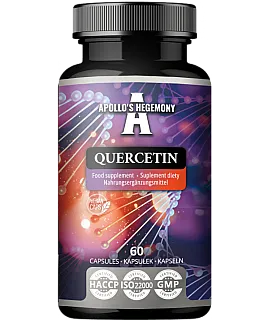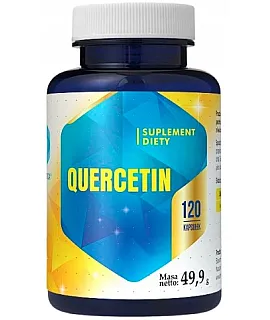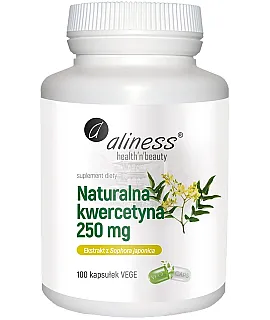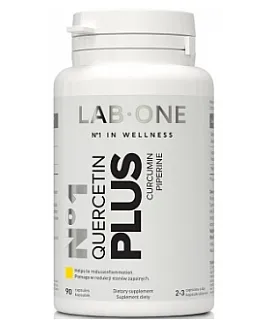Quercetin




Quercetin is a natural chemical compound from the flavonols group that is found in many plants, fruits and vegetables. It is one of the most potent antioxidants, which helps protect the body from the damaging effects of free oxygen radicals. Quercetin also exhibits anti-inflammatory, anti-allergic and anti-cancer effects. It is available in the form of dietary supplements, usually in capsule form. Read more
Properties and effects of quercetin
Quercetin is classified as a flavonoid, which are compounds with strong antioxidant activity. Quercetin is used in the production of medicines and dietary supplements. Its health-promoting properties mean that it can have a positive effect on health, especially when combined with a varied diet rich in fruits and vegetables.
Sources of quercetin in the diet
Quercetin is present in many plants, vegetables and fruits. Particularly rich sources include onions, cabbage, apples, black currants, green tea and red wine. Quercetin is also contained in honey, fennel and some herbs such as chamomile and St. John's wort.
The amount of quercetin consumed with food can vary depending on diet. The average diet provides about 10-100 mg of quercetin per day. People following a diet rich in vegetables and fruits can consume up to 200-500 mg of quercetin per day.
To increase your intake of quercetin, it's a good idea to include foods rich in this flavonoid in your diet. Regular consumption of fresh vegetables and fruits, especially onions, apples and cabbage, can provide the body with significant amounts of quercetin.
Quercetin supplementation
Quercetin is available in the form of dietary supplements, usually in capsule form. Quercetin supplements can contain from 250 to 500 mg of this substance per serving. The recommended daily dose of quercetin is 250 to 1,000 mg per day, divided into several servings.
It is a good idea to consult a doctor or pharmacist before starting quercetin supplementation, especially if you are taking other supplements or medications. Quercetin may interact with some medications, such as antibiotics or anticoagulants.
Supplements with quercetin should be kept out of the reach of small children. Pregnant and breastfeeding women should exercise caution and consult their doctor about taking supplements.
Potential health benefits
Quercetin, due to its properties, can provide many health benefits. Regular intake of quercetin with food can contribute to:
- Supporting the immune system
- Supporting the cardiovascular system
- Enhancing protection against oxidative stress
- Alleviating the symptoms of allergies
- Improving the condition of skin, hair and nails
It is worth remembering that quercetin should be part of a varied diet, rich in vegetables and fruits. Supplementation alone is no substitute for a healthy lifestyle and balanced nutrition.
Potential side effects and contraindications
Quercetin is generally recognized as safe (GRAS) by the US FDA. However, side effects such as nausea, headaches and allergic reactions may occur in some cases.
A contraindication to quercetin supplements is hypersensitivity to the substance. People with chronic diseases, such as diabetes, kidney or liver disease, should exercise caution and consult a doctor about taking supplements.
Quercetin may interact with some medications, so inform your doctor about all medications and supplements you are taking before starting supplements. Particular caution should be exercised by those taking anticoagulants, antibiotics or high blood pressure medications.
Key information about quercetin:
- A natural compound from the flavonols group with powerful antioxidant properties.
- Found in many plants, vegetables and fruits (onions, apples, cabbage)
- Available in the form of dietary supplements, usually in capsule form
- Recommended dose: 250-1000 mg per day, divided into several servings
- May interact with some medications
- Contraindications: hypersensitivity to quercetin, caution in chronic diseases